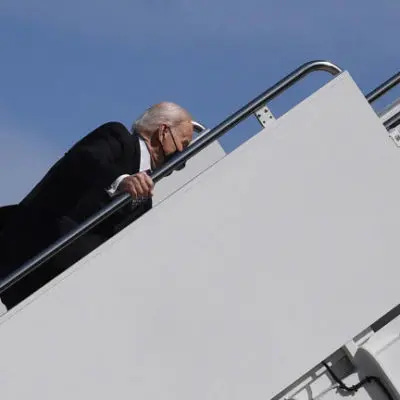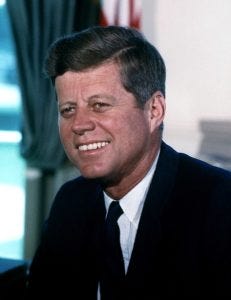Presidents and the Age Question
By Tevi Troy
President Biden’s strange and somewhat disconnected performance in the wake of the disaster in Afghanistan has once again raised questions about his age. He is both the oldest president elected as well as the oldest person to serve as president. Even his partisans acknowledge—gingerly, to be sure—that he “has lost some speed off of his fastball,” or some kind of similar circumlocution. But while Biden at 78 is indeed the oldest president, he is far from the first to face the age question.
The president who has faced the most questions about his age was Ronald Reagan, who left office at 77. Indeed, until Biden, Reagan was the oldest person to serve as president. After he failed to secure the GOP nomination in 1968, the speculation began that his window for running for president might have passed. Reagan ran again for the Republican nomination in 1976, more seriously this time, but he was already in his mid-60s.
He was also running against Gerald Ford, a sitting GOP president, which complicated matters. Ford’s team, understandably, tried to make an issue of Reagan’s age even then. As Reagan aide Charlie Black recalled, “the Ford people, it’s natural, they were peddling Reagan was too old, was too conservative, probably not smart enough, etc.” Ford ultimately won the nomination, but the age issue was probably not a determining factor, as Ford was only two years younger than Reagan.
When George H. W. Bush ran against Reagan for the top Republican slot in 1980, the age issue came up again. Bush often made a point that being 56 was the perfect time to run for president. He did not say, although it was obvious, that Reagan by definition was not the perfect age. Bush also jogged a lot, showing off his mid-life vigor, and would claim that he was “up for the ‘80s.” These ploys annoyed the Reagan people, who felt—correctly—that Bush was trying to play up the age contrast without alienating older voters by explicitly mentioning it.
This indirect strategy demonstrated its limits in the famously testy debate between Reagan and Bush in Nashua, New Hampshire, shortly before the 1980 New Hampshire primary. The moderator tried to make the implicit explicit, asking Bush if he thought Reagan was too old to be president. Pressed on the issue, Bush responded, “No, I don’t.” The moderator then asked Reagan the same question, and Reagan had the perfect answer: “I agree with George Bush.”
Reagan faced the age issue again when running for reelection in 1984. He was by this time in his 70s and had been nearly killed by a would-be assassin in 1981. At times he also appeared old, turning in a poor performance in the first presidential debate against the Democratic presidential nominee, former Vice President Walter Mondale, then 56. Reagan’s problem was not only his age, but his debate preparation. Office of Management and Budget Director David Stockman, who served as the stand-in for Mondale in prep sessions, took the role quite seriously and badgered the president, at one point getting a flustered Reagan to tell him to “shut up.” Stockman claimed that White House Chief of Staff Jim Baker pressed him to be so tough on Reagan, but some of Stockman’s colleagues suspected that he enjoyed one-upping the president.
After the first debate went so poorly, the Reagan team brought in communications guru Roger Ailes to help right the ship. Ailes ended the mock debates and the briefing book drills and tried to get Reagan to relax. He told the president “to go back to your instincts. Just say what comes to you out of your experience.” Once Reagan relaxed, Ailes warned the president that the age issue would come up in the next debate. Reagan agreed, and said, “Well, there’s an old line I’ve used before.” When the moment happened, Reagan was ready. When asked the “age question,” Reagan famously said, “I am not going to exploit for political purposes my opponent’s youth and inexperience.” The audience erupted in laughter, and, at that moment, even Mondale knew that the election was over.
Reagan may have been the oldest before Biden, but he was not the only other president to face the age question. Dwight Eisenhower was inaugurated at 63 and served until he was 71. He also had some health challenges as president, suffering a heart attack in 1955 and a stroke in 1957. After the heart attack, he spent seven weeks away from the White House, recuperating at a hospital in Denver. Eisenhower’s age was a factor in his health problems, but he compounded matters by being a heavy smoker.
Ike’s age came up repeatedly during his presidency, both to his advantage and disadvantage. He was happy to make jokes about his age to rescue himself from a reporter’s questions. When, for example, Ruth Montgomery from the International News Service asked him if he was irked about criticism from Woodrow Wilson’s widow, he deflected the question with humor, saying, “I think I am too old a campaigner to be bothered by many things.”
But when something truly did bother him, namely the scandal of his chief of staff, Sherman Adams, for taking a gift of a vicuña coat, he was less effective at deflecting the age issue. Eisenhower told reporters that despite Adams’ actions, he was going to keep him on “because I need him.” The pressure became too great, and he eventually dropped Adams, but the reporter Tom Wicker later observed that Ike’s plaintive expression of need “seemed to vindicate those who charged that Eisenhower was too ill or too old, or both, to be president.”
On the other side of the age debate, there is the question of whether a president is too young. The Constitution specifies a minimum age of 35 to be president, recognizing that we do want at least some level of maturity from those assuming the nation’s top job. (There is no constitutional maximum age, although perhaps there should be.) This issue came up repeatedly with respect to John F. Kennedy, who at 43 was the youngest person to be elected president. When Kennedy was running to be the Democratic Party’s nominee, Harry Truman worried that he was too young for the job. Once Kennedy became the nominee, the loyal Democrat Truman’s concerns went away.
John F. Kennedy, the youngest person ever to be elected president, faced questions about his relative youth and inexperience. Image Credit: Cecil Stoughton, White House
Kennedy’s opponent Richard Nixon—who was only four years older than Kennedy—pressed the issue of Kennedy’s “experience,” an implicit criticism of Kennedy’s youth. But Kennedy had a strong rejoinder, which he gave in his acceptance speech at the 1960 Democratic Party convention: “The Republican nominee-to-be, of course, is also a young man. But his approach is as old as McKinley. His party is the party of the past.”
Once Kennedy became president, he appointed his younger brother Robert as attorney general. JFK handled potential critiques of the pick with his trademark humor, famously joking, “I can't see that it's wrong to give him a little legal experience before he goes out to practice law.” Bobby, however, did not find his brother’s joke amusing, telling the president afterwards, “You shouldn’t have said that about me.” When Kennedy responded that “you’ve got to make fun of yourself in politics,” Bobby had a ready answer: “You weren’t making fun of yourself. You were making fun of me.”
Even younger than JFK was Teddy Roosevelt, who became president at 42. Roosevelt, however, was elevated from the vice presidency after President William McKinley was assassinated. Roosevelt’s problem ultimately was not that he was too young to be president, but that he was too young to be ex-president. His close friend and chosen successor as president, William Howard Taft disappointed Roosevelt, who unwisely chose to run against Taft. When Roosevelt failed to secure the GOP nomination, he ran as a third-party candidate. The result was that both men lost to Woodrow Wilson, and the friendship was lost as well. Roosevelt also died too young, at 60, in 1919.
The average age of a U.S. president is 55, and anyone significantly older or younger than that will inevitably face the age question. The issue, however, is not about age per se, but about how one handles it. The presidency is a famously grueling job, as before and after photos of most people who have held the job show. If someone can handle the job, then age should not be an impediment, but if someone can’t handle it, then there is going to be a problem regardless of the president’s age.
Anyone running at a non-traditional age should not let the inevitable questions deter them. They should also deflect the questions with humor, as Will Rogers did when he criticized those who wanted to remove Herbert Hoover’s Vice President, Charles Curtis, in 1932: “They are out now to throw poor old Injun Charley Curtis off and get another vice president. . . . Their alibi is that he is too old. . . . Well, they knew a few months ago how old he would be about now.”
Tevi Troy is a visiting fellow at the Mercatus Center at George Mason University and a former senior White House aide. His latest book is “Fight House: Rivalries in the White House from Truman to Trump.”



